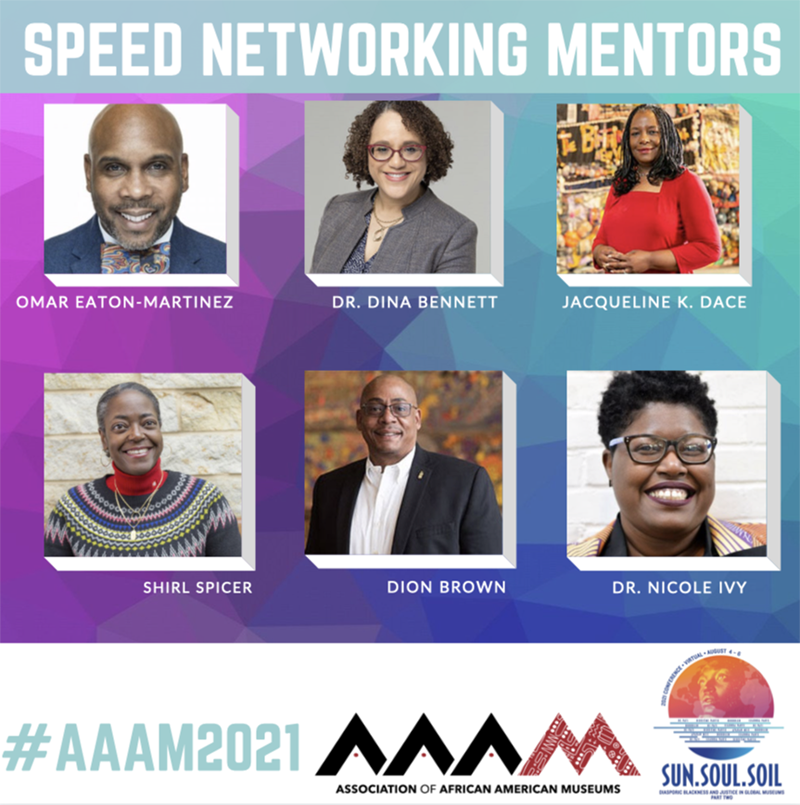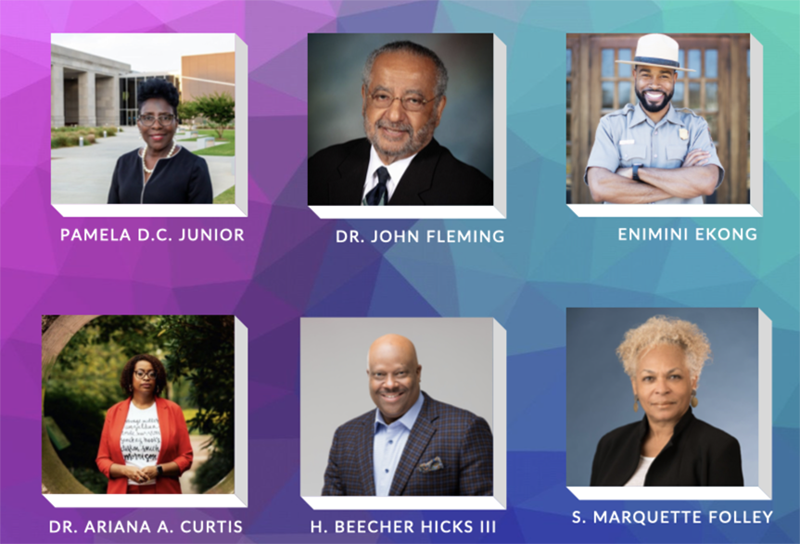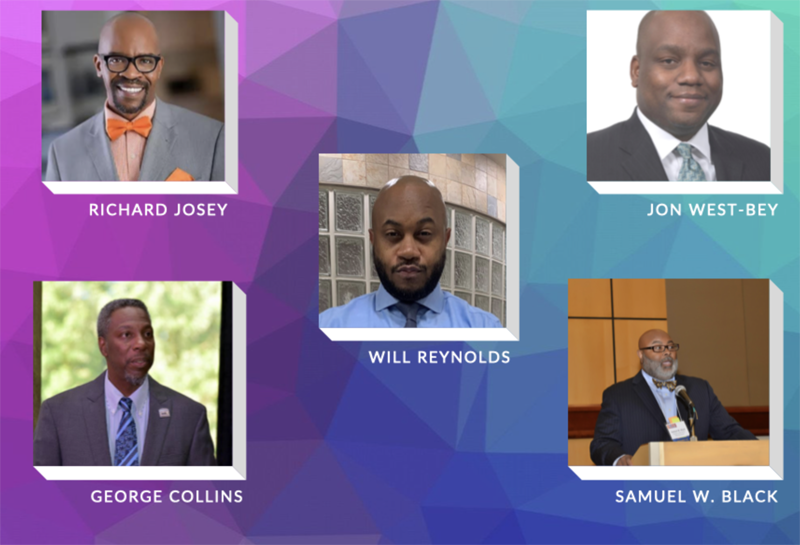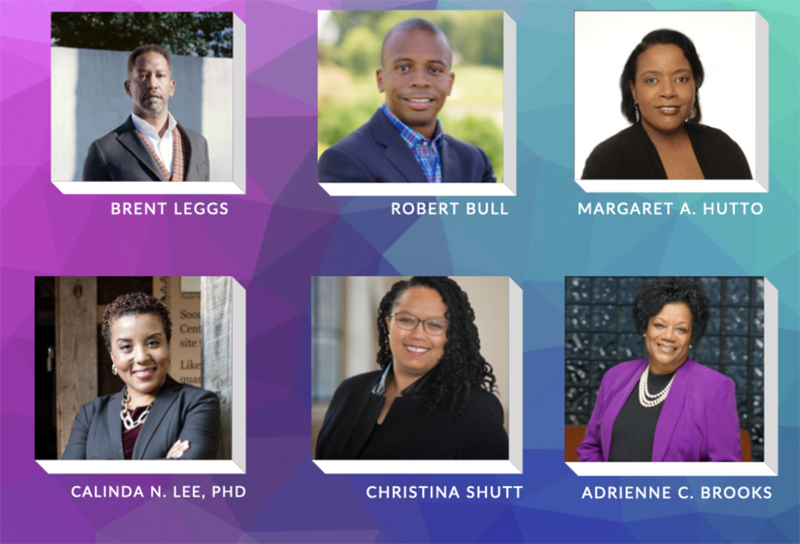
AAAM Board Members:
(click on the names to view the bios)

AAAM Members:
Pamela D. C. Junior is the newly appointed director of the Two Mississippi Museums in Jackson, Mississippi. As former manager of Smith Robertson Museum and Cultural Center, Pamela fought passionately and tirelessly to make the museum a first-class place of interpretation, bringing the museum from financial struggles to features across the nation, most notably, one of CNN’s “50 States, 50 Spots.” After seventeen years of service at Smith Robertson Museum, Pamela became the inaugural director of the first state-sponsored civil rights museum in the nation, the Mississippi Civil Rights Museum, where she welcomed more than 250,000 visitors in her first year. Today, she is at the helm of the Two Mississippi Museums where she continues her tireless work to share the stories of Mississippi with audiences all over the world. Pamela believes the stories told in the Museum of Mississippi History and the Mississippi Civil Rights Museum should be used as an educational tool for students. In her words, “If we teach children about the history of Mississippi—sharing the events that give us hope and bring us despair in a public space, where we see examples of people who never gave up, whose strength and tenacity can now give us hope and inspire us all to see others as we see ourselves— you will secure a twinkle in the eyes of many that will last a lifetime.”
Pamela has been honored over the years for her professional work as well as her community work. In 2015, she was awarded the Margaret Walker Center’s coveted For My People Award, in 2018 she was selected as Visit Jackson’s Hometown Hero and the Magnolia Bar Association’s Harriet Tubman Award, and most recently, she was honored with the 2019 Association of African American Museums Leadership Award for her work in the museum field.
Pamela continues to serve her community with her recent appointments as board member for Visit Jackson and advisory board member for the Mississippi Book Festival. She is also an active member of Women for Progress of Mississippi, where she is a champion for women’s rights. As a woman who knows that she did not get to this position without standing on the shoulders of many women whose vision for African Americans lives on today, she gives homage to the great women of her life such as her grandmother, mother, and mentors.
Pamela is a native of Jackson, Mississippi, and earned a B.S. in Education, with a minor in Special Education from Jackson State University.
Dr. John E. Fleming joined the museum profession in 1980 as the founding director of the National Afro-American Museum and as a senior staff member of the Ohio Historical Society. He is the former director of the National Underground Railroad Freedom Center and the Cincinnati Museum Center. He served as the president of the Ohio Museums Association, the Association of African American Museums, and the Association for the Study of African American Life and History. He served on numerous committees of the American Association of Museums including on the Executive Committee. He was director of the International African American Museum in Charleston and senior consultant for the development of the Mississippi Civil Rights Museum in Jackson. Currently he is the director of the National Museum of African American Music in Nashville. He is a graduate of Berea College where he serves on the Board Trustees. He received his M.A. and Ph.D. from Howard University. He was awarded distinguished service awards from Berea College, The National Peace Corps, the Association of African American Museums, and the AASLH.
Enimini Ekong currently serves in a detail as a Project Manager for the NPS Workforce & Inclusion Directorate. He recently served as the Superintendent of Nicodemus National Historic Site and Chief of Education and Interpretation at Brown v. Board of Education National Historic Site. Since joining the National Park Service in 2010, Enimini has worked at eight different park units holding positions as an Interpretive Ranger, Training Instructor, Park Curator, and Public Information Officer before taking on his current roles.
A native of Dallas, Texas Enimini Ekong earned his Bachelors of Arts degree in History from Baylor University, Waco, Texas and a Master’s of Arts degree in African American Studies from Morgan State University, Baltimore, Maryland. Enimini currently resides in Riverdale, MD with his lovely wife and three children.
Dr. Ariana A. Curtis is the inaugural Director of Content for Our Shared Future: Reckoning with Our Racial Past, the Smithsonian’s national initiative exploring race and racism. She is also the first curator of Latinx Studies at the National Museum of African American History and Culture.
Ariana has presented widely, including at SXSW, Chautauqua Institution, and The Schomburg Center. Her TED talk has over 3 million views. She has written for scholarly and popular audiences and appeared in national media outlets. Ariana holds a doctorate in Anthropology. She is a Fulbright scholar and a founding member of the Black Latinas Know Collective.
H. Beecher Hicks III’s professional experiences are in the private, public, and nonprofit sectors, joining the National Museum of African American Music in 2009 as a board member, becoming President and CEO in 2013. His banking experience includes roles as an investment banker at Bank of America and as a partner with private equity group Red Clay Capital Holdings. In 1998, Henry was appointed by President William J. Clinton to be a White House fellow, serving as senior adviser to the CEO of the Corporation for National and Community Service and launched the AmeriCorps Promise Fellows program. He is a member of the boards of directors for Leadership Nashville, the Center for Nonprofit Management, and the Nashville Downtown Partnership. Henry is a graduate of Morehouse College and earned an MBA in finance from UNC Chapel Hill. He is married to Crystal, an elementary educator, and they have two sons.
Marquette Folley is a social and cultural historian and exhibition developer and project manager. She came to the Smithsonian Institution in 1983 as a fellow to work on the National Museum of American History exhibition Field to Factory: Afro-American Migration, 1915-1940. Later, Folley joined the curatorial staff in the musical history division of the museum and worked to increase and broaden the jazz holdings of the museum. Currently, Folley is content director at the Smithsonian Institution Traveling Exhibition Service (SITES).
At SITES, she was co-curator and co-creator of the exhibition and book titled Seeing Jazz, and exhibition developer and project director for the traveling exhibitions The Negro Motorists Green Book, Men of Change: Power. Triumph. Truth.,and 100 Faces of War. Her past works include Romare Bearden: A Black Odyssey, Women, Art, and Social Change: The Newcomb Pottery Enterprise, American Letterpress: The Art of Hatch Show Print, William H. Johnson: An American Modern, Black Wings: American Dreams of Flight, 381 Days: The Montgomery Bus Boycott, and Louis Armstrong: A Cultural Legacy.

Richard Josey is the Founder and Principal Consultant for Collective Journeys LLC. As a nationally recognized facilitator, interpreter, and equity and inclusion consultant, Richard has spent over 25 years in the history field. His current work centers on how museums and historical sites can become better venues for mitigating trauma and promoting healing. Richard’s work is guided by a question he heard from a Dakota elder: “What Kind of Ancestor Will You Be?” He currently serves as a member of the American Association for State and Local History’s governing board and as the Diversity and Inclusion Committee Chair.
Will Reynolds is the Finance Manager for the Smithsonian Institution’s National Museum of American History. His responsibilities include preparing and monitoring annual operating budgets, serving as the Accountable Property Officer for the museum, coordination of content and logistics for public programs, and a host of other duties. Will has worked in non-profit financial management his entire career.
Areas of expertise:
- Financial stewardship
- Organizational management
- Visitor experience
George Collins is a retired Baltimore City fire fighter and president and founder of The African American Fire Fighters Historical Society. His life experience made transition to the museum feid much easier as he pursued this nonprofit venture. His fire and military service gives him a mission drive mindset, to get things done. His advocacy as a community leader provides knowledge of political and government processes that has allowed him to forge relations with elected officials and staff on all levels of government. His value of young people and opportunities for them is a constant reminder of the need to invest in the future today.
His current project is the creation of The International Black Fire Fighter Museum & Safety Education Center, an effort to bring the history of Black fire fighters to the tourism industry in Maryland and the world.
Jon West-Bey is an independent curator and museum consultant based in Washington DC. He is also a Lecturer in the Master of Arts in Museum Studies Program at Johns Hopkins University. During his over 24 year career, Jon has curated over 50 exhibitions and produced and managed numerous award winning public, educational, and multimedia programs over multiple disciplines including history, art, and cultural studies. He is also the founder of the American Poetry Museum in Washington, DC and spent 10 years as its Executive Director.
Samuel W. Black is the Director of the African American Program at the Senator John Heinz History Center. He is a former President of the Association of African American Museums (2011-2016) and served on the Executive Council and the Advisory Council of the Association for the Study of African American Life & History (ASALH) as well as the program committee of the American Alliance of Museums. Black is a member of the Afro-American Historical & Genealogical Society of Pittsburgh and the former vice president of the ASALH Dr. Edna B. McKenzie Branch. He serves on the board of directors of the International Black Business Museum. He is the recipient of the Dr. John E. Fleming Award of the AAAM in 2016, a 2018 graduate of the Jekyll Island Management Institute of the Southeastern Museums Conference (SEMC) and a 2019 Fulbright Germany Transatlantic Seminar Curator of the Smithsonian Institution and Leibniz Association of Germany.
Black is the curator of award winning exhibitions, “Soul Soldiers: African Americans and the Vietnam Era” America’s Best Weekly: A Century of the Pittsburgh Courier” “From Slavery to Freedom” and“The Vietnam War 1945-1975” (2019). He is the curator of African American historical and cultural content at the Heinz History Center including the Western Pennsylvania Sports Museum.
He is the author of a number of essays, book reviews, and narratives including, “African American Photographers of Cleveland, 1930-1965” in Yet Still We Rise: African American Art in Cleveland, 1920-1970; “The National Underground Railroad Freedom Center: Museum of Conscience” in Ohio Valley History Journal. His pending articles and reviews include “African Americans in the Vietnam War” in Oxford University Bibliographies.
Black is the editor of Soul Soldiers: African Americans and the Vietnam Era (2006) and co-author of Through the Lens of Allen E. Cole: A Photographic History of African Americans in Cleveland, Ohio (2012) and editor of The Civil War in Pennsylvania: The African American Experience (2013).

Brent Leggs is the executive director of the $25 million African American Cultural Heritage Action Fund at the National Trust for Historic Preservation and the Senior Advisor and Adjunct Associate Professor at the University of Pennsylvania’s Center for Preservation of Civil Rights Sites. Brent authored Preserving African American Historic Places and led efforts to establish the Birmingham Civil Rights National Monument. From his work to protect NY’s Madam C. J. Walker’s Villa Lewaro, NC’s Nina Simone’s Childhood Home, and other national places important in American history, he promotes the equitable interpretation and restoration of our nation’s historic landmarks as a tool for racial equity and economic justice.
Robert Bull, Jr. serves as president of The Compass Group, guiding the company’s exceptional consulting services while also driving strategic growth and development. Robert’s career spans more than two decades of fundraising consultation resulting in more than $1 billion in philanthropic gifts across the sectors of conservation, healthcare, arts, and education.
Robert’s impact through fundraising extends beyond his client work into the world of education. He is a seasoned educator, teaching individuals and institutions next-level success through his dynamic speaking, presenting, and lecturing in the classroom and beyond.
Robert holds a Master of Science degree in Organizational Leadership and Management from Antioch University New England and a Bachelor of Arts degree in Theatre and Arts Administration from Goucher College. He has completed coursework at Antioch University in pursuant of his doctoral degree within the Graduate School of Leadership and Change.
Margaret A. Hutto has spent her thirty-year career in the arts working at a diversity of museums and organizations including art, history and cultural institutions. Her primary areas of expertise are exhibition development and installation, curation, collections care, and museum management. Margaret holds several degrees in History, Fine Arts, English Literature and Journalism. Her community service and volunteer work on the governing and community advisory boards of Washington Public Educational Television (WETA) and Community Crisis Services has expanded her experience and expertise in non-profit management and governance. Margaret’s professional work has included positions with the Contemporary Arts Museum of Houston, the Smithsonian Institution, the National Library of Medicine, the Washington, DC Public Art Program, the Historical Society of Washington, D.C., the Reginald F. Lewis Museum of Maryland African American History and Culture and the National Gallery of Art where she currently serves as the exhibition analyst and oversees the museum’s exhibition management system. Margaret considers one of the major highlights of her career to be the mentoring of young museum professionals and artists through fellowships, internships, and one-on-one career development.
Calinda N. Lee, PhD – Head of Programs and Exhibitions – Educated at Spelman College (BA), New York University (MA) and Emory University (MA and PhD), Calinda N. Lee joined The Center to head up our substantive program work on education, civic engagement, facilitated conversations, and training experiences for diversity, equity and inclusion, law enforcement and advocacy. In this role, Calinda’s historical expertise informs opportunities to connect stories and events from the past with current day circumstances. The value of community engagement in historical interpretation as well as civil and human rights work is of utmost importance to Calinda, and informs programs and initiatives under her leadership.
Calinda previously served as Vice President of Historical Interpretation and Community Engagement for the Atlanta History Center. In this role, she served as chief historian, considering historical interpretation for all aspects of the region’s past to develop the AHC’s primary collections, historic houses, historic gardens, and public programs. Calinda also developed Community Engagements and the AHC’s Neighborhoods Initiative.
As a scholar and administrator, Dr. Lee has held teaching and administrative positions at Emory University, Loyola University Chicago and Spelman College. A prolific practitioner, she is an award-winning curator, writer, and educator. In addition to The Center and AHC, she has worked with institutions including the Albuquerque Museum, the City Museum of Washington, DC, the Maryland Museum for African American Life and History, the Chicago History Museum, Emory University, among others.
Christina Shutt currently serves as the Executive Director for the Abraham Lincoln Presidential Library and Museum, the premier institution for understanding the history and legacy of Abraham Lincoln. Most recently Shutt served as the Executive Director for the Mosaic Templars Cultural Center (MTCC), the African American museum of history and culture for the state of Arkansas. Her innovative and collaborative leadership resulted in MTCC being awarded first-time national museum accreditation, making it only the ninth Black culture museum in the United States to receive this designation.
She earned a bachelor’s degree in history from Central Methodist University and holds two masters’ degrees in library science/archival management and history from Simmons University.
Adrienne C. Brooks is Director of Advancement at the Smithsonian’s National Museum of African American History and Culture, located in Washington, DC, which opened in September 2016. Ms. Brooks joined the museum in 2006 to lead its highly successful capital campaign. She continues to lead its ongoing fundraising program to build the endowment and provide overall program support. She also oversees the museum’s National Membership Program. Prior to joining the Smithsonian, Ms. Brooks was Vice President for Institutional Advancement at Xavier University of Louisiana, in New Orleans. She also served as Director of Major Gifts at Howard University in Washington, DC. A graduate of Columbia University in New York City, Ms. Brooks holds a Master of Science degree from the Columbia University School of Journalism.